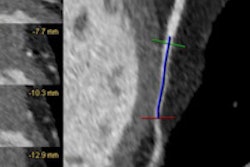Dear AuntMinnie Member,
It's a tough task to keep up with the latest twists and turns in the fiercely contested breast screening debate. This week's big news has come at the high-profile American Association of Physicists in Medicine (AAPM) meeting, where new research suggests radiation dose in mammography has been overestimated by as much as 30%.
The findings could influence when and how often women should undergo screening, and the Californian team is convinced dose estimates in mammography need fundamental revisions. Click here to learn more.
Fetal dose from CT also has come under intense scrutiny at AAPM 2015. For researchers, two central aims are to find out when it's safe to scan a pregnant patient and to provide tools that can easily and accurately estimate radiation dose to the fetus, and a team from Los Angeles thinks it's made progress in this area. Find out more here, or visit our CT Community.
Imaging professionals really don't need to be as fit as a butcher's dog, as us Brits like to say, but often the work is physically demanding, so good physical health must be a priority for all. Echocardiographer Doug Wuebben and trainer Mark Roozen have some practical tips for you to consider, including some tried and tested exercises. Click here to check them out.
Limiting breast MR screening to high-risk women maintains cost-effectiveness but loses the benefit to women at intermediate risk. A shorter breast MRI protocol could allow for lower cost and more rapid throughput, making breast MRI a useful alternative screening modality for women with dense breast tissue, say researchers from Duke University Medical Center. Visit our MRI Community or click here to learn more.
Last but not least, don't miss today's case of a 46-year-old man with a history of long-standing panhypopituitarism. To test your diagnostic skills, click here.




















